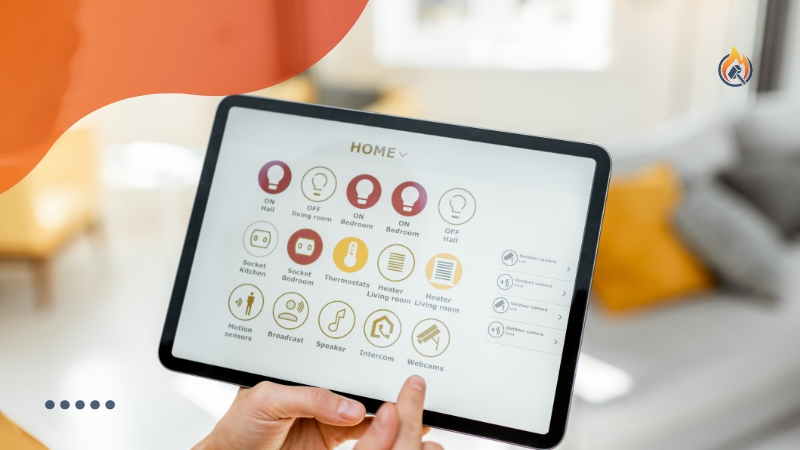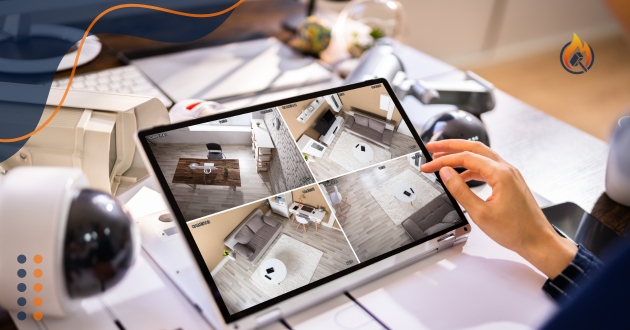Smart home automation systems are becoming an integral part of everyday life, transforming how people interact with their homes. These systems allow homeowners to control various devices and systems, such as lighting, security.
The growth of smart home automation systems has been fueled by the increasing demand for convenience and efficiency. Consumers are looking for ways to simplify their lives, and smart homes offer the perfect solution.
With the rise of the Internet of Things (IoT), smart home automation systems are expected to become even more sophisticated in the coming years. As more devices become interconnected, the potential for seamless integration and automation will grow.
Key Features of Smart Home Automation Systems

1. Convenience and Control
One of the primary benefits of smart home systems is the convenience they offer. These systems enable users to control various aspects of their home from a centralized platform.
Whether you are at home or away, you can easily monitor and adjust your home’s systems with a few taps on your smartphone.
Transitioning from traditional systems to automated ones also provides ease in managing multiple devices simultaneously, which can significantly improve daily routines.
2. Security Enhancements
Smart home automation have revolutionized home security. Integrated security cameras, smart locks, and alarm systems can be controlled remotely, allowing homeowners to monitor their property in real-time.
Moreover, these systems can send instant alerts in case of any suspicious activity, ensuring a higher level of safety.
3. Energy Efficiency
Another significant advantage of smart home systems is their ability to enhance energy efficiency.
Automated lighting, climate control, and even smart appliances can adjust based on user habits or external conditions, such as weather changes.
This leads to optimized energy use, reducing utility bills and minimizing environmental impact.
Future Trends in Smart Home Automation
1. Integration with AI and Machine Learning
As smart home systems continue to evolve, integration with artificial intelligence (AI) and machine learning will play a crucial role.
These technologies will enable systems to learn user preferences over time and make adjustments automatically, further enhancing the user experience.
2. Expansion of IoT in Smart Homes
With more devices becoming interconnected through IoT, the scope of smart home automation will expand. Homes will become more intelligent, with systems anticipating needs and acting independently to maintain comfort, security, and efficiency.
The Role of Blockchain in Smart Home Automation Systems
As smart home automation continue to evolve, the integration of blockchain technology is becoming an important factor in enhancing security and data privacy.
Blockchain can provide a decentralized framework that ensures data from smart devices remains secure and cannot be tampered with.
This is especially crucial in a home environment where sensitive data, such as security footage or personal preferences, needs to be protected.
For those interested in understanding how this technology works, you can explore more about blockchain technology explained, which delves into the core principles and applications of blockchain in various industries, including smart homes.
Innovative Devices for Smart Home Automation
One of the key elements in building an efficient smart home automation system is choosing the right devices that integrate seamlessly into your home.
Leading brands, like Samsung, offer a wide range of smart appliances and devices, from smart refrigerators to washing machines and televisions, all designed to communicate with each other and enhance the overall user experience.
These devices not only add convenience but also contribute to energy efficiency and home security by working together within a unified system.
FAQ: Smart Home Automation Systems
1. What are smart home automation systems?
Smart home automation are technologies that allow homeowners to control various devices and systems, such as lighting, security, and appliances, through a central interface. These systems can often be managed via smartphone apps, voice commands, or automated routines, providing enhanced convenience and efficiency in daily life.
2. How do smart home systems improve security?
Smart home automation systems can significantly improve security by integrating smart cameras, motion detectors, and smart locks that can be monitored and controlled remotely. These systems often send real-time alerts in case of suspicious activity, allowing homeowners to take immediate action, whether they are at home or away.
3. Can smart home automation help save energy?
Yes, smart home automation systems can help save energy by optimizing the usage of electrical devices like lights, thermostats, and appliances. These systems can adjust energy use based on real-time conditions, such as turning off lights when a room is empty or lowering the thermostat when no one is home, leading to reduced utility bills.
4. Are smart home systems compatible with older homes?
Yes, smart home automation systems can be installed in both new and older homes. Most smart devices are designed to be easy to retrofit, meaning they don’t require extensive remodeling. However, some systems may work more efficiently in homes with modern wiring or strong Wi-Fi connections.
5. Do smart home automation systems require professional installation?
While some smart home automation systems may require professional installation, many devices are designed for easy setup by the homeowner. Products like smart plugs, light bulbs, and cameras can typically be installed without the need for special tools or expertise.
6. Can smart home automation systems be controlled remotely?
Yes, one of the main advantages of smart home systems is the ability to control devices remotely. Whether you are at work or on vacation, you can use your smartphone or tablet to manage your home’s systems, including adjusting the thermostat, turning off lights, or locking doors.
7. Are smart home automation secure?
Smart home automation systems generally incorporate strong security features, such as encrypted connections and multi-factor authentication. However, it’s essential for homeowners to follow best practices, such as regularly updating devices and using strong, unique passwords to ensure the system’s security.
Conclusion
In conclusion, smart home systems are revolutionizing how we interact with our living spaces, offering unparalleled convenience, security, and efficiency. From controlling devices remotely to optimizing energy use, these systems make it easier to manage daily tasks and enhance the overall comfort of our homes.
As technology advances, integration with AI, IoT, and even blockchain will further elevate the capabilities of smart homes, making them more adaptive, secure, and personalized. Leading companies, such as Samsung, are driving this innovation, offering a variety of devices that seamlessly fit into modern automated systems.
Looking ahead, smart home automation will continue to play a crucial role in sustainable living, health monitoring, and entertainment, shaping the future of homes worldwide. As adoption grows, these technologies will become more accessible and essential for daily life.


